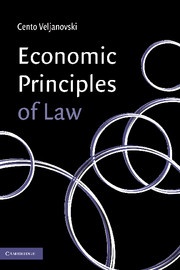3 - Property
Published online by Cambridge University Press: 03 December 2009
Summary
What is common to the greatest number, gets least amount of care.
AristotleProperty rights arise because resources are scarce. In a world without scarcity there would be no need to have property rights because there would be abundance. If someone takes your apple, you simply move onto the next apple tree. Where resources are scarce, they have to be allocated between users and uses, and this requires some formal or informal recognition of who owns the resource – and, most importantly, the rights and constraints that attach to ownership. The common law deals with property rights through three branches of the law – property rights are created and defined through the law of property, transferred to higher-value uses through the law of contract (see chapter 5) and protected through the law of torts, particularly trespass, nuisance and crime.
PROPERTY RIGHTS THEORY
Property rights define the nature of political and economic systems, and their economic performance. The economics of property rights tells us why.
The case for property
Consider a world where there was no legally enforceable property and ownership rights. If the ownership of a plot of land or a car was not recognised, anyone could either claim or steal it. The constant threat of theft and the consequent losses would have a number of effects. First, considerable effort and resources would be devoted to asserting claims over others' land and assets, and stealing by individuals and corrupt government officials, and in protecting them from being taken.
- Type
- Chapter
- Information
- Economic Principles of Law , pp. 58 - 108Publisher: Cambridge University PressPrint publication year: 2007



